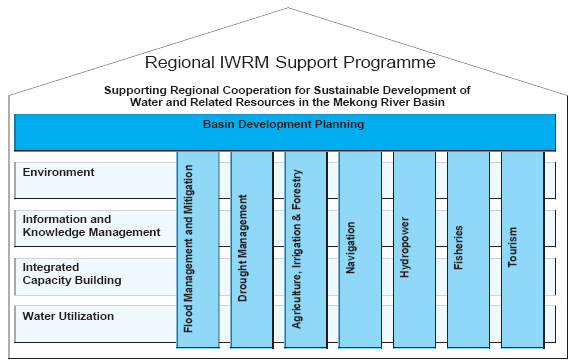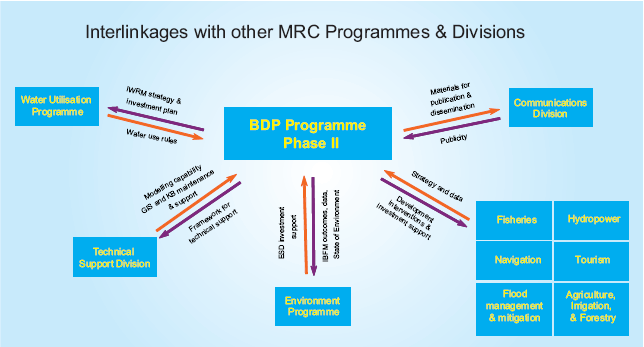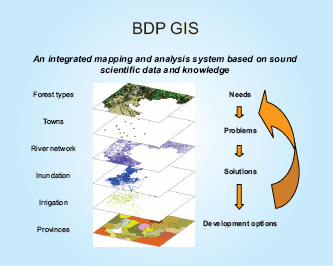BDP2 - the plan goes forward
The next decade will bring many challenges to the basin and its people. As the population grows there will be increased pressure on the basin's economic resources and it will be essential to make better and more efficient use of the basin's water and related resources to meet development needs.
However joint planning of these developments at basin scale is crucial if they are to be well-balanced and sustainable and this is where the MRC, through its Basin Development Plan is planning to play a leading role in the region. Now entering its second phase (BDP2) the programme will focus on the consolidation of its planning capacity and on its use for planning development solutions, concentrating mainly on projects with transboundary impact and fostering regional cooperation in the water resources sectors.

In its first phase, the BDP focused on the building of a participatory process for assessing priority needs and development issues, including trans-boundary issues. This planning will now be used as a blueprint to identify, categorise and prioritise the projects and programmes to seek assistance for and to implement the plan at basin level. In the current terminology, the plan is an Integrated Water Resources Management (IWRM) and Development Plan.
BDP2 will play a strong promotional and facilitating role for a wide range of projects to be implemented by national authorities and suitable regional service providers and implementing partners. One of the main tasks under BDP2 is to identify these projects and programmes and to seek assistance for implementation at basin level, with a balanced and equal consideration of the environmental, social and economic aspects.
MRC anticipates a stream of projects will be identified and promoted for implementation by line agencies, national authorities and other relevant service providers and implementing agencies. This will be achieved in close partnership with the international donor community and development banks.
The mechanisms, tools and criteria developed under Phase 1 will be used to ensure long-term sustainability of all planned developments. Special attention will be paid to financial and institutional sustainability of a selected undertaking.
BDP Phase 1 laid some groundwork on institutional framework and legal basis for national integrated water resources development. These initial analyses will be enhanced further under BDP2 and lead MRC to a thorough understanding of the national medium and long-term strategies of the member countries and their implications for the river basin, which will allow a more pro-active engagement of MRC in relevant matters.

Planning capacity and tools will be further consolidated. The role of the Geographical Information System (GIS) as central planning tool will be enhanced and the integration between data acquisition, data management, GIS and modelling will be strengthened. To formulate the plan at basin scale, information sharing and joint analysis is required in each sector, involving the line agencies of the four member countries and, as far as possible, the two upstream countries China and Myanmar. This central planning tool – together with the Decision Support Framework (DSF) – will also be used to support decision-making and IWRM at national level in the member countries.

The MRC Secretariat will be able to provide on-demand specific information, feasibility studies, impacts assessments and other technical services to the Member States. BDP2 will substantially improve the network between line agencies, provincial authorities, river basin committees or organisations and non-government organisations and concerned communities necessary for smooth facilitation and promotion of significant and larger scale development interventions.
As the BDP is strongly linked to all other MRC programmes through the MRC's integrated programme structure, the BDP process will used acquired knowledge from within the other MRC programmes and build up an overall perspective of what the development needs are. This process will also be able to identify "knowledge gaps", which can help set the agendas of the programmes and will contribute to MRC's overall role in promotion of water-related sustainable development, knowledge base development, capacity building and regional cooperation.
Under BDP2 MRC sees a stronger orientation towards the activities undertaken by other organisations and agencies in the Mekong River Basin taking place and it envisages a close interaction with other IWRM actors in the Mekong River Basin both on national and regional level.
The IWRM Strategy prepared during Phase 1 will be revised periodically, to reflect new knowledge and new development needs and priorities.
Choose a newsletter: